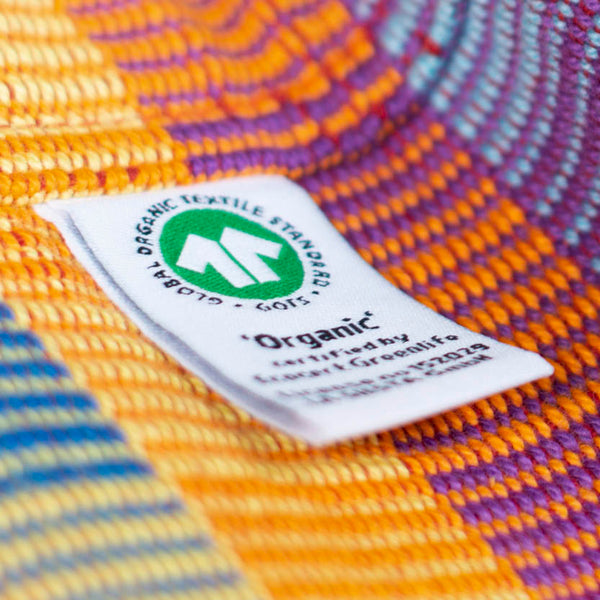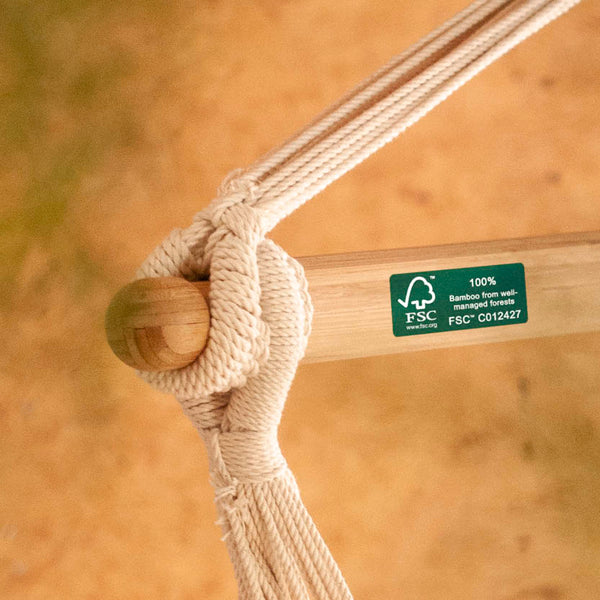Our Commitment to the Climate
At LA SIESTA, we want more: more relaxation for everyone, more hammock moments in everyday life, and more of the good life – but also more responsibility for the environment and the climate. We take this responsibility seriously, among other things, as a ClimatePartner-certified company. On this page, you will learn exactly what that means and why working with ClimatePartner is an important part of our sustainability strategy.
1 | Why we are committed
Sustainable relaxation is a matter close to our hearts - and has been since the birth of LA SIESTA. From the very beginning, it was clear that we wanted to minimize our impact on the planet and take a holistic approach to sustainability. As a manufacturer of consumer goods and an online retailer, we are aware of the impact of our activities on the climate. That is why we continuously work to reduce our carbon footprint. However, there are still emissions that we cannot currently avoid or reduce. We also want to take responsibility for these emissions. For support in all these steps, we have chosen to collaborate with ClimatePartner.

2 | What ClimatePartner certification means
Our company and our Colombian hammocks and hammock chairs are ClimatePartner certified. This means we have calculated our greenhouse gas emissions, defined reduction targets, continually implemented reductions, and financed climate projects. With the ClimatePartner certified label and the corresponding climate-ID page, we communicate transparently about the climate action steps we are taking.
Our collaboration with ClimatePartner currently encompasses two dimensions:
3 | How the certification works
1: Calculate carbon footprints
Together with ClimatePartner, we calculated our corporate carbon footprint (CCF), meaning the greenhouse gas emissions related to our company. For this purpose, our team provides information every year on commutes and business trips, we determine the fuel consumption of our vehicles and allocate the emissions from our production processes to the corresponding product groups.
2: Set reduction targets
In addition to the volume of greenhouse gas emissions, our CCF highlights the key emission sources and where we can avoid or reduce them. For this purpose, we set targets and then derive reduction measures. Specifically, we have set ourselves the goal of reducing our emissions by 10% by 2026. This applies to all emissions that are directly generated by us, are under our direct control, or occur along our value chain.
3: Implement reductions
We have introduced and are continuously implementing reduction measures in line with our targets. A key component of our approach is to cover the majority of our electricity needs with green electricity, with 72% of total electricity consumption coming from our own green energy production. In addition, we offer charging infrastructure for electric vehicles at our German office location, enable our employees to use JobRads (company bikes), and have implemented procurement policies that consider climate-relevant aspects. We also update our CCF annually. This allows us to keep track of our reduction successes and to identify further opportunities.
4: Finance climate protection projects
Climate projects demonstrably avoid carbon emissions, for example through reforestation measures or by replacing technologies that are harmful to the environment. For the emissions that we cannot yet avoid or reduce, we take responsibility by supporting the internationally certified climate protection project emPOWERing in Africa.

4 | Climate protection project in Africa
Our new project to promote renewable energy in Africa marks another step in our commitment to the climate. After previously supporting a forest protection initiative and a biomass project in Colombia, we are now focusing on a project that harnesses Africa's potential for sustainable energy. This project aims to improve access to electricity for nearly half of the African population that is currently without power while saving approximately 446,770 tons of CO₂ annually. By supporting wind and solar energy projects, we help end energy poverty, reduce dependence on fossil fuels, and increase grid stability. In doing so, we also contribute to several United Nations Sustainable Development Goals, including affordable and clean energy, and promoting decent work and economic growth.

Other Topics
-
GOTS certified organic cotton
LA SIESTA is the first hammock brand with GOTS certification. -
FSC™ certified wood
We process wood from ecological forestry for our frames, hammock chairs and spreader bar hammocks. -
Centro LA SIESTA
The Centro LA SIESTA offers support to disadvantaged children in Fortaleza, Brazil.









